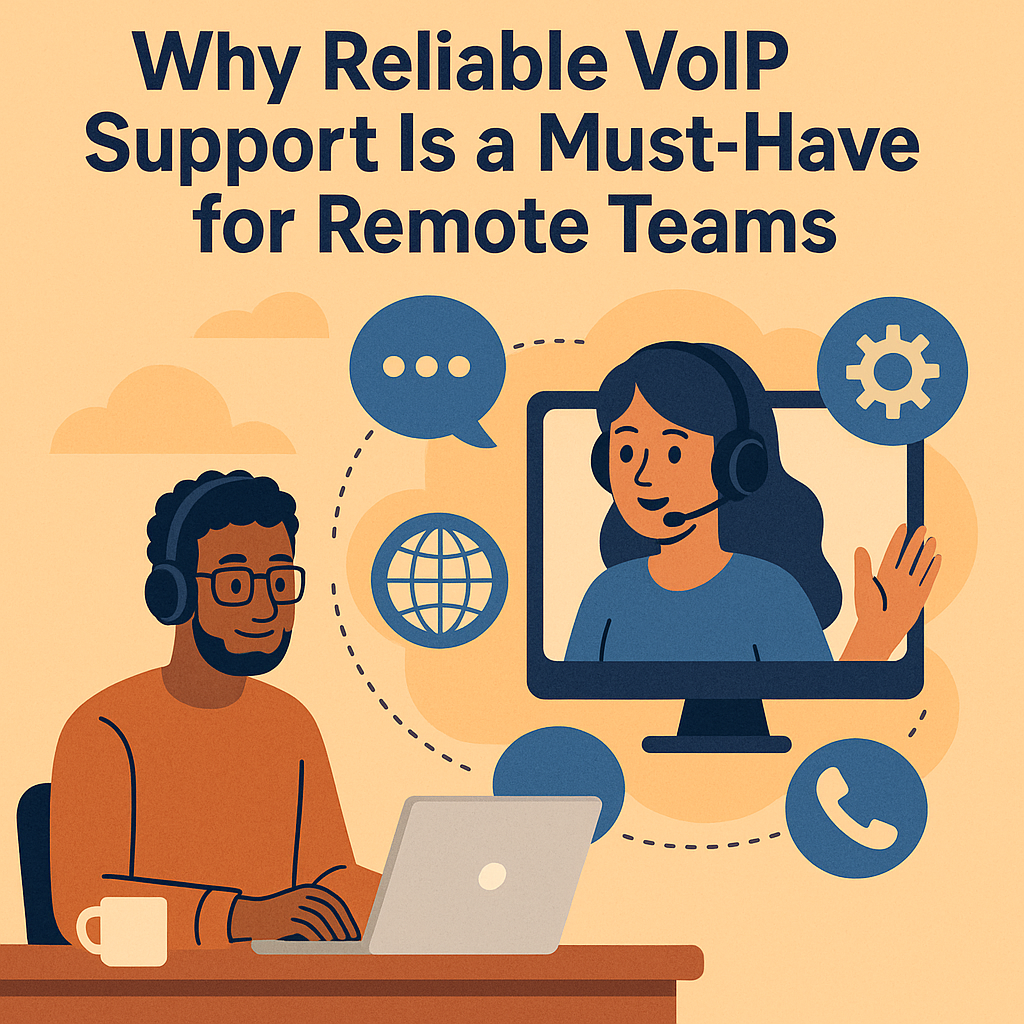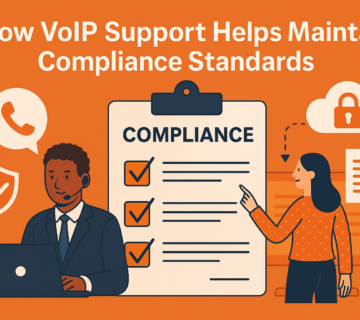How to Secure Your VoIP System from Cyber Threats
🔹 Introduction to VoIP Security
Voice over Internet Protocol (VoIP) is revolutionizing modern business communication, offering cost-effective, scalable, and feature-rich telephony services. However, as VoIP trends continue to evolve, businesses must remain vigilant against cyber threats. Without proper security, VoIP systems can become prime targets for hackers, leading to data breaches, financial loss, and operational disruptions.
This guide will provide you with in-depth knowledge of VoIP advancements in security, common cyber threats, and the top VoIP security solutions to safeguard your system. Whether you are using a VoIP system for personal use or through a top business VoIP provider, implementing these security strategies is crucial.
Understanding VoIP and Cyber Threats
🔹 What is VoIP?
VoIP technology enables users to make voice calls over the internet instead of traditional telephone lines. It has become an essential tool for businesses, allowing seamless communication across teams, clients, and global markets.
Some advantages of VoIP include:
✔️ Lower communication costs
✔️ Enhanced mobility and flexibility
✔️ Integration with AI-powered features
✔️ Advanced call management features
Despite these benefits, VoIP is susceptible to cyber threats that can compromise business operations.
🔹 Common VoIP Security Risks
Even the best business VoIP providers face security challenges. Some common risks include:
✔️ Call interception – Unencrypted VoIP calls can be tapped by hackers.
✔️ Vishing (VoIP phishing attacks) – Attackers trick employees into revealing confidential information.
✔️ Caller ID spoofing – Fraudsters manipulate caller IDs to deceive users.
✔️ Denial of Service (DoS) attacks – Hackers flood networks with excessive traffic, disrupting services.
✔️ Unauthorized access – Weak passwords and misconfigured settings can allow hackers to gain control of VoIP accounts.
Understanding these risks is the first step in securing your VoIP system.
Top Cyber Threats Targeting VoIP Systems
🔹 VoIP Phishing Attacks (Vishing)
Cybercriminals use voice-based phishing (vishing) to impersonate legitimate businesses and steal sensitive data. They often pose as company executives, IT support teams, or service providers to trick employees into providing login credentials.
🔹 Denial of Service (DoS) Attacks
A DoS attack overwhelms VoIP servers with excessive traffic, causing call disruptions and service outages. Businesses that rely on VoIP for customer service can suffer significant revenue losses due to downtime.
🔹 Call Interception and Eavesdropping
Without encryption, VoIP calls can be intercepted by hackers, leading to unauthorized access to private conversations and data leaks.
🔹 Spoofing and Caller ID Fraud
Fraudsters manipulate caller ID information to trick users into answering calls from fake businesses or government agencies. This can lead to financial fraud and reputational damage.
🔹 10 Best Practices to Secure Your VoIP System
1️⃣ Use Strong Authentication Measures
✔️ Enable multi-factor authentication (MFA) for all VoIP accounts.
✔️ Implement role-based access control (RBAC) to restrict access.
2️⃣ Encrypt VoIP Communications
✔️ Use Secure Real-Time Transport Protocol (SRTP) for call encryption.
✔️ Implement Transport Layer Security (TLS) to secure VoIP signaling.
3️⃣ Secure Your VoIP Network
✔️ Deploy VoIP-specific firewalls to filter malicious traffic.
✔️ Use a Virtual Private Network (VPN) for remote VoIP access.
4️⃣ Regularly Update and Patch VoIP Software
✔️ Keep your VoIP software and firmware up to date.
✔️ Enable automatic updates to patch vulnerabilities.
5️⃣ Monitor and Detect Anomalies in VoIP Traffic
✔️ Use AI-driven monitoring tools to detect suspicious activities.
✔️ Analyze call patterns for potential security threats.
6️⃣ Implement Call Restrictions and Whitelisting
✔️ Block unauthorized international and premium-rate calls.
✔️ Restrict VoIP access to trusted IP addresses only.
7️⃣ Educate Employees on VoIP Security Best Practices
✔️ Conduct regular security training and awareness programs.
✔️ Teach employees to recognize vishing and phishing attempts.
8️⃣ Use a Secure VoIP Service Provider
✔️ Choose a top business VoIP provider with built-in security features.
✔️ Look for providers that offer encryption, fraud detection, and AI-driven security solutions.
VoIP Integrated with AI in Small Business Communications Solutions
AI is transforming VoIP security and improving communication efficiency. Many best business VoIP providers now integrate AI to:
✔️ Detect and block fraudulent calls in real time.
✔️ Automate call analysis for security threats.
✔️ Enable voice recognition-based authentication.
Small businesses leveraging VoIP integrated with AI in small business communications solutions can enhance both security and operational efficiency.
How to Respond to a VoIP Cyberattack
🔹 Immediate Actions to Take
✔️ Disconnect compromised VoIP accounts.
✔️ Reset all affected passwords and enable MFA.
✔️ Notify your VoIP service provider and IT security team.
🔹 Recovery and Prevention
✔️ Conduct a post-attack security audit.
✔️ Implement additional security measures to prevent future breaches.
Future of VoIP Security – What’s Next?
As VoIP trends continue to evolve, new security solutions are emerging to counter cyber threats.
🔹 AI-powered threat detection – AI can analyze call patterns to detect fraud in real time.
🔹 Blockchain for call authentication – Blockchain technology ensures secure VoIP transactions.
🔹 5G-enhanced VoIP security – Faster and more secure connectivity for VoIP users.
These advancements will also address top business challenges solved by VoIP, such as call fraud, network security, and remote workforce communication.
FAQs About Securing VoIP Systems
Q1: How often should I update my VoIP system?
You should update your VoIP system at least once a month or whenever security patches are released.
Q2: Can VoIP calls be intercepted?
Yes, if they are not encrypted. Using top VoIP security solutions like SRTP and TLS can prevent interception.
Q3: What’s the best firewall for VoIP security?
A session border controller (SBC) acts as a firewall specifically designed for VoIP protection.
Q4: Is VoIP safer than traditional phone lines?
VoIP offers more features but requires strong security measures to match the safety of traditional landlines.
Q5: How can small businesses secure VoIP?
✔️ Use strong passwords and enable encryption.
✔️ Choose the best business VoIP providers that prioritize security.
Q6: Are free VoIP services secure?
Most free VoIP services lack encryption and security measures, making them riskier for business use.
Conclusion
With cyber threats constantly evolving, securing your VoIP system is essential. Implementing strong authentication, encryption, network security, and AI-driven solutions will help businesses stay protected.
As VoIP trends continue to shape the future of communication, staying ahead with the latest VoIP advancements in security will ensure your business remains secure and efficient. Whether you’re using a top business VoIP provider or a self-hosted VoIP solution, prioritizing security will safeguard your business from cyber threats. 🚀🔐




No comment